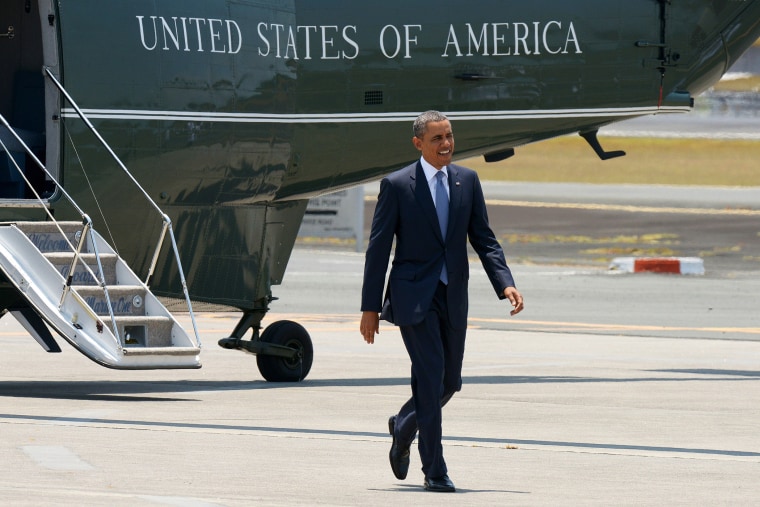President Obama will meet this week with leaders from throughout the Hemisphere at the Summit of the Americas, hosted this year in Panama, where attendees are expected to cover quite a bit of ground on energy policy, security, and economic measures.
But before the U.S. leader reaches the Central American country, Obama is making some stops, including a visit yesterday
to Jamaica. It was his first visit as president, and only
the second sitting president to visit the Caribbean nation since its independence.
It does raise the question, though, of why Obama made the trip, if there was no official reason to stop in Jamaica. The White House characterized it as little more than a goodwill excursion in which the president played tourist, but I think there's a little more to it.
The
New York Times published a piece exactly three years ago this week about international affairs that continues to be of great interest.
A brand new $35 million stadium opened here in the Bahamas a few weeks ago, a gift from the Chinese government. The tiny island nation of Dominica has received a grammar school, a renovated hospital and a sports stadium, also courtesy of the Chinese. Antigua and Barbuda got a power plant and a cricket stadium, and a new school is on its way. The prime minister of Trinidad and Tobago can thank Chinese contractors for the craftsmanship in her official residence. China's economic might has rolled up to America's doorstep in the Caribbean, with a flurry of loans from state banks, investments by companies and outright gifts from the government in the form of new stadiums, roads, official buildings, ports and resorts in a region where the United States has long been a prime benefactor.
And this most definitely includes Jamaica, where a Chinese company has invested heavily in sugar estates, and where the Chinese government has loaned Jamaica several hundred million dollars in loans for infrastructure.
We are, of course, far removed from a Cold War environment in which two global superpowers battled for influence and alliances around the globe, but the broader dynamic is not dissimilar -- it's clear that China sees itself as a 21st-century power, and it's eager to make inroads just about everywhere, including the Caribbean.
This is a part of American foreign policy that isn't often discussed, which Republicans tend to ignore, and which the White House cares deeply about in a very quiet way.
Indeed, this came up in January, when Obama made a high-profile return visit
to India, which has long been friendly with Russia, but which is now looking for a new friendly superpower to hang out with. As
Politico noted at the time, Obama would like the United States, not China, to be that friend: "As part of that strategy and [in] an effort to counterbalance China, Obama has looked to bolster India -- which is on course to overtake China as the world's most populous nation -- to make sure China has a strong rival in the region."
I suspect the U.S. president was thinking along similar lines when he agreed to visit Jamaica. The Caribbean has a new suitor, and the White House very likely wants to remind Jamaicans and others of the United States' longstanding ties to the region.
More from the Times' piece in 2012:
Several analysts in the Caribbean say they believe that China eventually will emerge as a political force in the region, with so many countries indebted to it, at a time when the United States is perceived as preoccupied with the Middle East and paying little attention to the region. "They are buying loyalty and taking up the vacuum left by the United States, Canada and other countries, particularly in infrastructure improvements," said Sir Ronald Sanders, a former diplomat from Antigua and Barbuda. "If China continues to invest the way it is doing in the Caribbean, the U.S. is almost making itself irrelevant to the region," he added. "You don't leave your flank exposed."
Maybe this would be a good time to note that reflexive opposition to foreign aid isn't always wise.
The Summit of the Americas begins tomorrow. Obama
will meet with leaders of the 15-member Caribbean Community today.
